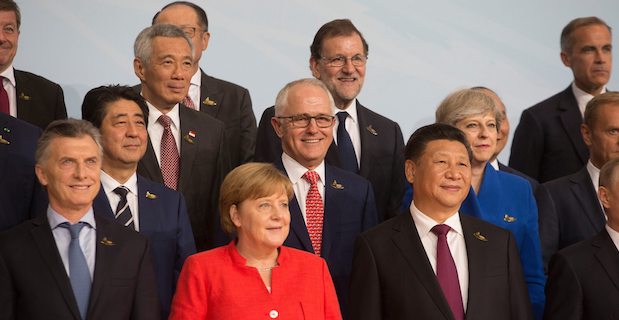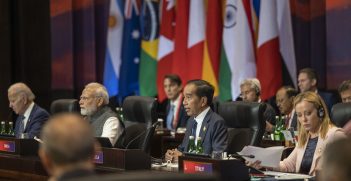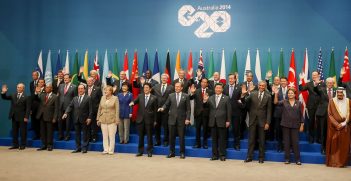Australia Wins Behind the Scenes at the G20

Expectations of the Hamburg G20 were not high, but the summit seems to have achieved even less than anticipated and, for the first time ever, the communiqué was not unanimous. However, if any country came away a winner from the weekend’s talkfest, it was Australia.
The Hamburg G20 was like no other. The conflict and chaos predicted by the media did not eventuate and United States President Donald Trump seemed to get along with most of the other 19 world leaders. The main event of the 24-hour, high-security meeting in Germany’s port city was Trump’s one-on-one with Russian President Vladimir Putin, which was cordial and lasted two hours, three times the allotted time. Eventually, Melania Trump was sent in to persuade the two men to return to the conference table.
The stoush between Trump and China’s President Xi Jinping, confidently forecast by the Australian press to end the friendship developed earlier this year when Xi visited the US, did nothing of the kind. Trump told Xi that he appreciated what he had done “relative to the very substantial problem we all have with North Korea. It may take longer than I would like, it may take longer than you would like, but one way or another there will be success in the end.”
For the first time in G20 history, the group produced a communiqué that was not unanimous, though the text was agreed by everyone. Trump apart, they agreed to a statement that all 19 countries which had committed to the Paris Agreement on climate change pledged to “fully implement an irreversible agreement”. The leaders took note of the planned exit from the agreement of the US, noting that the country “affirms its strong commitment to an approach that lowers emissions while supporting economic growth and improving energy security needs”.
Of course, Malcolm Turnbull was among those leaders who backed the Paris Agreement, defying advice from his backbench renegades led by Tony Abbott, aided and abetted by commentator Andrew Bolt. This put him in good stead with the host of the meeting, German Chancellor Angela Merkel, whom like French President Emmanuel Macron put climate change and free trade at the top of her agenda.
Turnbull and his wife Lucy struck up a good relationship with the Macrons, not least because they have similar values and aspirations. The French president offered the Turnbulls a lift to Paris in the Falcon presidential jet, giving ample time to talk about the proposed EU-Australia free trade agreement and the $50 billion-plus contract with a French government company to build 12 new Australian submarines (Turnbull will be opening an office in Cherbourg, Normandy in the coming week). Arriving in Paris, the Turnbulls were also invited to the Elysée Palace for dinner.
The G20 will give Turnbull something good to report to Cabinet on his return to Sydney, and the confidence to face down the naysayers in his party on the Finkel proposal. If it gets its act together, the Coalition should have no trouble in meeting a 45 per cent clean energy target, which will be achieved and even bettered by industrial Germany despite having a less conducive climate for solar power.
There were, of course, serious negatives about G20. It failed to make progress on the North Korean problem, as Kim Jung-un launches increasingly sophisticated missiles and is getting closer to his aim of becoming a nuclear power. China and Russia believe the only way for progress to be made is for the United States to end its ongoing military cooperation with South Korea. The US and Australia think China still has leverage it could effectively use. The reality is that Kim wants direct talks with Trump, which seems unlikely any time soon, although Kurt Campbell, US under secretary for Asia in the early days of the Obama administration, argues it is essential.
Britain’s Prime Minister Theresa May hailed President Trump’s statement that the US could complete a trade deal with the UK very quickly after Brexit. However, the Brexit process is progressing badly on the UK side with most of the business community now in open revolt and the Tory party split on tactics. May herself is on borrowed time as leader. Opposition leader Jeremy Corbyn is now ahead in the polls, and continuing to score points. For example, he pointed out that “the prime minister is quite happy to spend £1 billion to protect her own job (a reference to the payment demanded by Northern Ireland’s Democratic Unionists to allow the Conservatives to have a parliamentary majority) but will not spend that amount on underpaid nurses and policemen”.
G20 unrest
The big negative from G20 was the mayhem in the streets of Hamburg, created by assorted anarchists, socialists, greens, arch-feminists and anti-globalisation protesters. They collectively decided the best way to show their disapproval of a gathering of 20 world leaders was to smash shop windows, torch more than 100 expensive cars, loot shops (including an Apple store and a famous pharmacy), block the city’s streets, disrupt public transport and injure countless police, who showed remarkable restraint. Five hundred officers were hurt, mostly by stones, rocks and broken bottles.
Much of the appropriately named ‘March to Hell’ was conducted in the name of so-called progressive politics which is anything but progressive. In Germany, at least, it is more reminiscent of the bad old days. There was a time when large demonstrations could be conducted peacefully. What happened in Hamburg upset the citizens of a peaceful and proud city. It left many thinking that Angela Merkel’s bold decision to stage the meeting in Hamburg, rather than on a remote North Sea island or in a castle, was a big mistake.
What did G20 achieve? Not much, to be honest. Nothing likely to re-stimulate sagging economic growth, which has disappointed despite the 2014 Brisbane G20 being “all about growth”. Hamburg will be forgotten within a week, which begs the question as to whether these hugely expensive summits serve any useful purpose.
Certainly, two half-day meetings with 20 leaders and their coterie of advisers and hangers-on are not going to solve the world’s problems. President Trump left the meeting with America’s authority diminished rather than enhanced. Nicholas Burns, a former senior state department official and NATO ambassador, said the US was “more isolated” than at any time he could remember. He blamed Trump, telling the Financial Times, “the US cannot lead effectively if we are constantly criticising our allies”.
By a quirk of good fortune, Australia—a rank outsider and only there because of the country’s long record of economic growth—was one of the winners. Malcolm Turnbull had conversations with the least accessible top leaders, enhancing his international reputation, and thanks to his conversations with Macron, is now within spitting distance of another important global trade deal. Remaining in G20 is a worthwhile Australian foreign policy goal.
Colin Chapman is a writer, broadcaster and public speaker, who specialises in geopolitics, international economics and global media issues. He is immediate past president of AIIA NSW.
This article is published under a Creative Commons Licence and may be republished with attribution.





